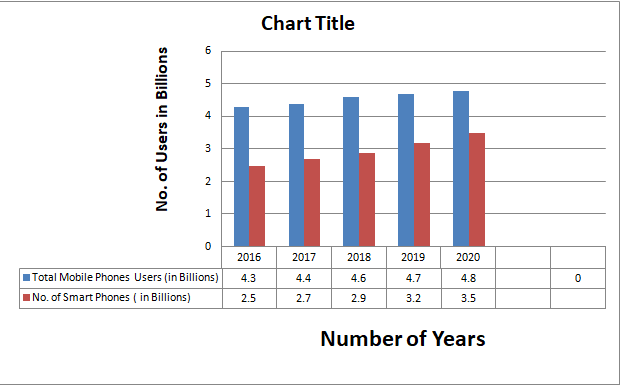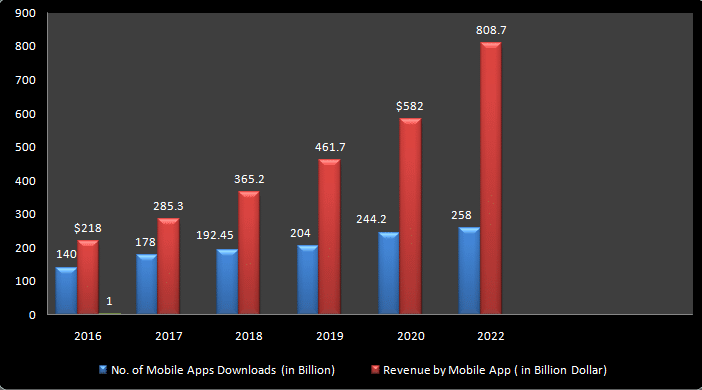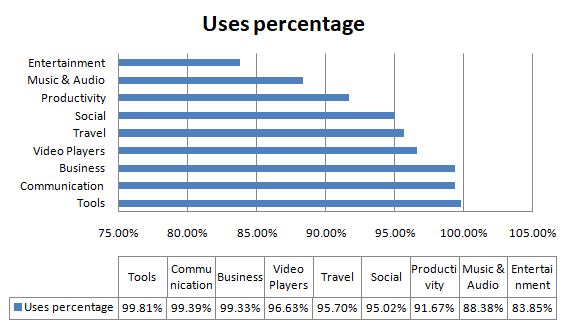Which One to Choose – Mobile Application or Mobile Websites?
The technology is growing at a rapid speed, and so is the growing need of people from diverse sectors. This change is visible in the consumer market too. The industry has come a long way from small retail shops to online shopping to mobile shopping today.
The growing influence of mobile commerce is motivating an increasing number of businesses and retailers to own online mobile shopping platforms to increase their sales. However, many people are still not aware of whether to go for mobile websites or mobile applications for the purpose.
To find out, we will first have to understand the difference between mobile applications and websites.
How are mobile websites and mobile applications different?
In this article, you will get to know the strengths and weaknesses of both the mediums. The reasons for the growing number of users are abandoning mobile sites and shifting their loyalty towards mobile apps.
- Mobile websites are websites optimized for mobile devices. Mobile websites have smaller fonts, fewer page elements and crammed text presentation, compared to desktop versions.
- While mobile websites are complex and are not suitable for shopping purposes.
- Though anybody can access mobile websites on the internet, just like desktop versions, their checkout feature and overall experience are not smooth and user-friendly.
- Mobile applications are lighter, cleaner and more user-friendly programs that can be stored in a local device with more relevant content. Mobile apps are accessed through the internet and can function both online and offline once downloaded.
- The mobile apps use native features of devices they are stored in, which helps developers in developing faster and better user experience for the users.
- Mobile applications with more shopper-friendly features are the perfect option for business and shopping.
What are the Benefits of Mobile App Development?
- Increases Your Brand Value
Mobile applications can build an impressive image for you in your industry. If you own an app, then your consumers can reach out to you directly, giving them more opportunity to interact with you. The interaction builds a strong bonding between you and your audience. If you can develop a very engaging discussion with your prospective customers, and develop a trust factor in their minds, then it will shape your brand reputation in the market.
- Enhances Global Reach
Mobile applications can be accessed across the globe by your prospective audience. Your global customers can easily connect to you and become your loyal customers. You can enhance your visibility and expand your brand reach.
- Builds Customer Loyalty
It is far more convenient for customers to connect to you via mobile applications than mobile websites. They find apps far simpler and more user-friendly. The content is systematically presented, and there are not too many elements and texts to confuse. Customers find the content easy to grasps and navigate. The checkout process is very simple and can be completed within a maximum of 2 to 3 steps. Purchase, refund, return, exchange, all the functionalities are easy and smooth. Customer support is available for live chat to help consumers with their queries and delays in delivery. There is a real-time tracking feature that is a big attraction for users. Since your apps are easily accessible and far more approachable than websites, the chances of building customer loyalty are good.
- Enhances Your Revenue
Mobile applications come with features that are useful in marketing and promotional activities. Push notification is one of the most interesting features that help in keeping your consumers informed about your new launches, deals and discounts. Push notification encourages users to take prompt action. With apps available 24×7 with users, if they find attractive deals, they tend to make purchases.
- Helps Recognize Customer Behavior
Apps allow businesses to capture data far more conveniently. When users download the application, companies can use the opportunity to ask some relevant questions that can help them understand consumer behavior. Moreover, they can also use mobile application analytics to understand what their consumers like and do not like. The other option is, they can run surveys and ask their consumers to create wish lists of the items they plan to purchase. The search history of users can easily help businesses recognize customer behaviour.
Businesses get instant updates on whether consumers are showing interest in their new launches or not. Users also give immediate feedback for the purchased products.
The user data that is collected can prove to be beneficial in the growth of businesses. This information can be used to target potential customers in a more organized manner using, ads and recommendations based on their purchase history. The information can also help businesses meet customer expectations and build a more customer-centric experience.
People Are Spending More Time in Mobile Apps
The online business is continuously evolving and is the only way to stay in business by adopting this new normal. In the present market conditions apps are becoming a necessity to remain relevant in business.
- In 2019, people spent 90% of their leisure time on mobile applications. The ease of use has made mobile applications far more popular than websites, be it the desktop version or the mobile version.
- In recent years, we have witnessed constant growth in the number of mobile internet users. This leaning towards mobile usage had prompted industry experts to predict the mobile-first trend for the businesses.
- If we assess the amount of time spend on applications and websites, mobile applications will emerge as clear winners.
- The growing inclination towards mobile applications started in 2017 when applications were leading at 87% usage, compared to 13% use on web browsing.
- In 2019, people spent more time on their mobile phones than browsing websites or watching TV.
- More than 70% of the user were smartphone users.
- Mobile applications give direct access to consumers from the device screen as compared to the web experience, apps are faster and hassle-free.
- The growing preference for apps proves that the demand for apps is only going to increase, which makes more companies opt for apps and abandon traditional websites.

Mobile Apps Usage and Statistics Until 2019
Whether it is about what drives people to mobile applications? Or types of apps that influence users most, or the number of time people spend in applications; here are some of the user stats that prove mobile applications are here to stay. The stats will indicate what people are enjoying most online and what is the platform they prefer most.
Key indications
- According to Statista, about 178 billion apps were downloaded in 2017—and the number is consistently growing. This number is predicted to grow to 258 billion by 2022 that is 45% rise within five years.
- Another study by Statista says, mobile apps would hit $188.9 billion marks in revenue generation by the end of the year 2020, which 113% rise over four years from 2016 when the total revenue was $88 billion. It proves consumers are more comfortable with mobile devices and applications.
- The Mary Meeker report of 2017 shows, though internet usage is increasing every year, the difference between the website and application usage is uninterruptedly growing that depicts continuously drop in website/desktop usage and rise in mobile internet usage.
- A study by Statista says, 42% of consumers used shopping app after shopping online on websites. It proves they enjoyed the experience and wish to continue with it and do more shopping shortly.
- According to Business Insider, Amazon, Gmail, and Facebook are the three apps that new generation prefers most, an indication that mobile shopping is not going anywhere.
- ComScore has found, the younger generation spends maximum time on mobile applications and excited to learn more about new apps.

Consider these Factors Before Starting Mobile App Development
Before plunging into anything, it is important to take note of all the factors that can impact the plan. It goes the same with mobile application development. What makes mobile apps so popular with the users, if it would be favourable for your business type, which platform is right for your type of business and what exactly you must feature in your application are some of the questions that you must ask yourself.
The massive shift of users from websites to applications proves that users are comfortable with mobile devices and are increasingly investing in easy to operate devices like smartphones.
However, this is not stopping people from demanding quality in mobile application development. Developers and companies need to be very particular about quality, usability, performance and functionality of the mobile application to help companies get a competitive edge over their competitors.
It is the convenience in handling and ease of use that makes apps advantageous for both businesses and consumers. Whether you are a start-up or an established company, there is no dispute about the fact that mobile applications can be a great opportunity to gain customer’s trust and loyalty.
Essential Factors That Companies Must Consider Before Starting Mobile App Development
- Market Study
This is one of the most essential factors to consider before starting the development of mobile applications. Be it any business, companies must try to read the pulse of the industry and the market. Meeting the market and consumer demand must be the first criteria of any business. Analyze what competitions are doing, understand what consumers are looking for, try to gauge the weaknesses and strengths of competitors, review consumer feedbacks, and address them. All this helps in avoiding mistakes during the development.
- Identify the Target Audience
A company with the best application and no audience loses the main purpose of developing an application. Identifying the target audience is one of the major factors that motivate business to function in the right direction. A business with no target audience is directionless and fails miserably. Knowing the expectation of the target audience is the first step towards the success of an application. If a business fails to meet the demands of its consumers, then it will fail to meet the application goals as the success of the application depends on the satisfaction of its customers.
- Pick the Right Platform
This is a critical factor that many fails to understand. It is important to understand which platform is more popular amongst the target audience – iOS or Android or both, and this will help in making a maximum impact without affecting the quality, functionality, performance and security.
- Make Noise About the Launch
Promoting your application is another important factor that companies cannot miss in this highly competitive market. Making noise is important to receive a maximum response. Making the target audience aware of the mobile app is as important as meeting their expectation. Start making the noise 2 to 3 weeks before the launch. Create a market strategy on how to reach out to potential markets. Hiring a digital marketing agency would be a great way to ensure the success of the application.
- Impressive Interface
How appealing is the application, can it engage users for a longer duration? How do users feel while using the application? These factors must bother any company if they care to meet the expectation of their customers. If the app is incapable of attracting and engaging users, then it fails to survive in the market. No matter what content the application has, if the UI and UX is not appealing then it is ought to fail. Hence companies need to invest big in the overall user experience of mobile apps.
- User Security is Primary
Information security is primary for all users. How safe user data and the online transaction would be in an application are very critical factors that need to be addressed by the companies. Companies must put privacy policy in the apps and mention in detail how they will use the collected data. They must assure their users that their data won’t be misused and at the same time, install a robust system for the storage and protection of the sensitive data.

Complete Your Homework before Choosing a Mobile App Development Company
All the above factors must be considered by companies, before starting mobile application development for their business. Currently, more and more businesses are adopting mobile application technology to reach out to their customers. The above points will help them in building a robust system that will further help in the growth of their business.